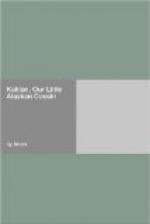As they gazed spellbound, a strange thing occurred, a thing of such wonder and beauty that Ted could but grasp his father’s arm in silence.
Suddenly the peaks seemed to melt away, the white ice-pinnacles became real turrets, houses and cathedrals appeared, and before them arose a wonderful city of white marble, dream-like and shadowy, but beautiful as Aladdin’s palace in the “Arabian Nights.” At last Ted could keep silent no longer.
“What is it?” he cried, and the old chief answered, gravely:
“The City of the Dead,” but his father said:
“A mirage, my boy. They are often seen in these regions, but you are fortunate in seeing one of the finest I have ever witnessed.”
“What is a mirage?” demanded Ted.
“An optical delusion,” said his father, “and one I am sure I couldn’t explain so that you would understand it. The queer thing about a mirage is that you usually see the very thing most unlikely to be found in that particular locality. In the Sahara, men see flowers and trees and fountains, and here on this glacier we see a splendid city.”
“It certainly is queer. What makes glaciers, daddy?” Ted was even more interested than usual in his father’s talk because of Kalitan, whose dark eyes never left Mr. Strong’s face, and who seemed to drink in every word of information as eagerly as a thirsty bird drinks water.
“The dictionaries tell you that glaciers are fields of ice, or snow and ice, formed in the regions of perpetual snow, and moving slowly down the mountain slopes or valleys. Many people say the glaciers are the fathers of the icebergs which float at sea, and that these are broken off the glacial stream, but others deny this. When the glacial ice and snow reaches a point where the air is so warm that the ice melts as fast as it is pushed down from above, the glacier ends and a river begins. These are the finest glaciers in the world, except, perhaps, those of the Himalayas.
“This bids fair to be a wonderfully interesting place for my work, Ted, and I’m glad you’re likely to be satisfied with your new friends, for I shall have to go to many places and do a lot of things less interesting than the things Kalitan can show you.
“See these blocks of fine marble and those superb masses of porphyry and chalcedony,—but there’s something which will interest you more. Take my gun and see if you can’t bring down a bird for supper.”
Wild ducks were flying low across the edge of the glacier and quite near to the boys, and Ted grasped his father’s gun in wild excitement. He was never allowed to touch a gun at home. Dearly as he loved his mother, it had always seemed very strange to him that she should show such poor taste about firearms, and refuse to let him have any; and now that he had a gun really in his hands, he could hardly hold it, he was so excited. Of course it was not the first time, for his father had allowed him to practise shooting at a mark ever since they had reached Alaska, but this was the first time he had tried to shoot a living target. He selected his duck, aimed quickly, and fired. Bang! Off went the gun, and, wonder of wonders! two ducks fell instead of one.




